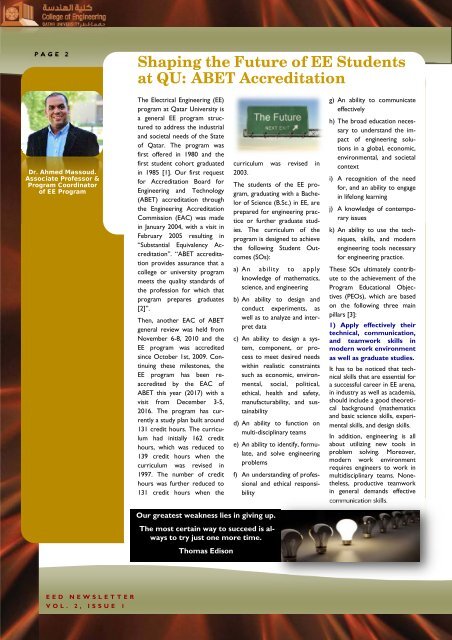EED-Newsletter-Vol-2-Issue-1-2017
You also want an ePaper? Increase the reach of your titles
YUMPU automatically turns print PDFs into web optimized ePapers that Google loves.
PAGE 2<br />
Shaping the Future of EE Students<br />
at QU: ABET Accreditation<br />
Dr. Ahmed Massoud.<br />
Associate Professor &<br />
Program Coordinator<br />
of EE Program<br />
The Electrical Engineering (EE)<br />
program at Qatar University is<br />
a general EE program structured<br />
to address the industrial<br />
and societal needs of the State<br />
of Qatar. The program was<br />
first offered in 1980 and the<br />
first student cohort graduated<br />
in 1985 [1]. Our first request<br />
for Accreditation Board for<br />
Engineering and Technology<br />
(ABET) accreditation through<br />
the Engineering Accreditation<br />
Commission (EAC) was made<br />
in January 2004, with a visit in<br />
February 2005 resulting in<br />
“Substantial Equivalency Accreditation”.<br />
“ABET accreditation<br />
provides assurance that a<br />
college or university program<br />
meets the quality standards of<br />
the profession for which that<br />
program prepares graduates<br />
[2]”.<br />
Then, another EAC of ABET<br />
general review was held from<br />
November 6-8, 2010 and the<br />
EE program was accredited<br />
since October 1st, 2009. Continuing<br />
these milestones, the<br />
EE program has been reaccredited<br />
by the EAC of<br />
ABET this year (<strong>2017</strong>) with a<br />
visit from December 3-5,<br />
2016. The program has currently<br />
a study plan built around<br />
131 credit hours. The curriculum<br />
had initially 162 credit<br />
hours, which was reduced to<br />
139 credit hours when the<br />
curriculum was revised in<br />
1997. The number of credit<br />
hours was further reduced to<br />
131 credit hours when the<br />
curriculum was revised in<br />
2003.<br />
The students of the EE program,<br />
graduating with a Bachelor<br />
of Science (B.Sc.) in EE, are<br />
prepared for engineering practice<br />
or further graduate studies.<br />
The curriculum of the<br />
program is designed to achieve<br />
the following Student Outcomes<br />
(SOs):<br />
a) An ability to apply<br />
knowledge of mathematics,<br />
science, and engineering<br />
b) An ability to design and<br />
conduct experiments, as<br />
well as to analyze and interpret<br />
data<br />
c) An ability to design a system,<br />
component, or process<br />
to meet desired needs<br />
within realistic constraints<br />
such as economic, environmental,<br />
social, political,<br />
ethical, health and safety,<br />
manufacturability, and sustainability<br />
d) An ability to function on<br />
multi-disciplinary teams<br />
e) An ability to identify, formulate,<br />
and solve engineering<br />
problems<br />
f) An understanding of professional<br />
and ethical responsibility<br />
g) An ability to communicate<br />
effectively<br />
h) The broad education necessary<br />
to understand the impact<br />
of engineering solutions<br />
in a global, economic,<br />
environmental, and societal<br />
context<br />
i) A recognition of the need<br />
for, and an ability to engage<br />
in lifelong learning<br />
j) A knowledge of contemporary<br />
issues<br />
k) An ability to use the techniques,<br />
skills, and modern<br />
engineering tools necessary<br />
for engineering practice.<br />
These SOs ultimately contribute<br />
to the achievement of the<br />
Program Educational Objectives<br />
(PEOs), which are based<br />
on the following three main<br />
pillars [3]:<br />
1) Apply effectively their<br />
technical, communication,<br />
and teamwork skills in<br />
modern work environment<br />
as well as graduate studies.<br />
It has to be noticed that technical<br />
skills that are essential for<br />
a successful career in EE arena,<br />
in industry as well as academia,<br />
should include a good theoretical<br />
background (mathematics<br />
and basic science skills, experimental<br />
skills, and design skills.<br />
In addition, engineering is all<br />
about utilizing new tools in<br />
problem solving. Moreover,<br />
modern work environment<br />
requires engineers to work in<br />
multidisciplinary teams. Nonetheless,<br />
productive teamwork<br />
in general demands effective<br />
communication skills.<br />
Our greatest weakness lies in giving up.<br />
The most certain way to succeed is always<br />
to try just one more time.<br />
Thomas Edison<br />
<strong>EED</strong> NEWSLETTER<br />
VOL. 2, ISSUE 1


